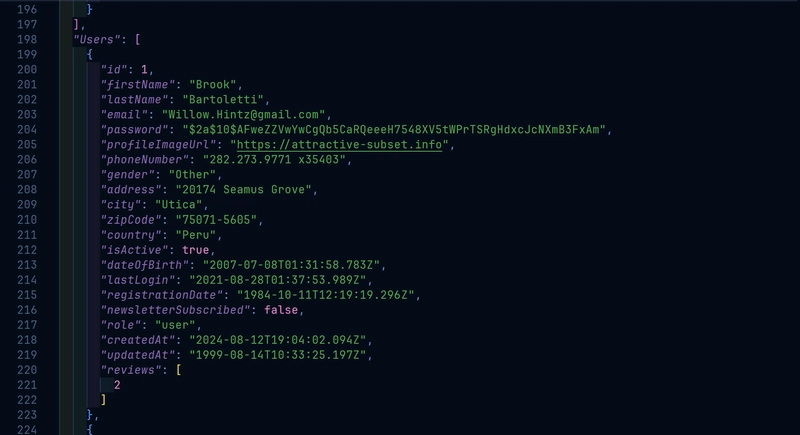Ever built an app and wasted hours manually seeding test data or faking API responses? Whether you're testing a UI, simulating an API, or populating a dev database, mock data is essential. But creating it shouldn't be a chore.
That’s where the Mock Data Generator VS Code extension comes in.
This extension is built to simplify and automate the creation of mock data across different databases and model types. No more hardcoding test users, faking API responses by hand, or wasting time creating scripts to seed your local dev database. This tool does all that and more right from your VS Code workspace.
In this article, I’ll explain the extension's purpose, why it was built, and how you can use it to boost your dev workflow.
Why This Extension?
As a developer working with microservices and multiple database types, I constantly needed realistic mock data to seed databases for development, test APIs before real data exists, simulate various edge cases, or build isolated frontend components. This part of the development can be boring and time-consuming. Existing solutions were either too simple with lorem ipsums everywhere, too rigid, required writing scripts, or lacked flexibility for diverse schemas. The Mock Data Generator, a powerful yet lightweight VS Code extension, was created to bridge these gaps. It lets you create realistic, customizable, and model-aware mock data in seconds right inside your coding environment.
Common Use Cases
- Seeding development databases (MongoDB, PostgreSQL, SQL Server, and more)
- Testing application features with real-world-like data
- Creating JSON or SQL output for frontend/backend integration
- Validating model relationships and constraints
- It supports multiple ORMs, database types, and can infer from TypeScript interfaces.
- Auto-detecting schema from Typescript, Mongoose, and ORM models
Core Features at a Glance
Here’s what makes this extension stand out:
- Supports Multiple ORMs & Databases: Works with MongoDB, PostgreSQL, SQL Server, and more.
- Hashed Passwords for Auth Testing: Bcrypt support for password fields.
- Mock Directly to Database: Push generated data straight into MongoDB or SQL databases.
- Intelligent Field Detection: Recognizes fields like email, password, createdAt, and generates appropriate values.
- Relation Mapping: Automatically generates related data between models (e.g., users and posts).
- Customizability: Developers can define mock rules and overrides via config files.
- Intelligent Model Detection: Reads only true models and ignores non-models like enums, request, and response classes...
- Supports both local and remote databases
Using the Extension
Step 1: Install the Extension
Search for Mock Data Generator in the VS Code Extensions Marketplace
Step 2: Run the Extension
Create or open a project, and access extension features via the Command Palette (Ctrl+Shift+P or Cmd+Shift+P). Run Mock Data Generator. This will give you a drop-down menu of options.
Step 3: Generate Mock Data
Select the Generate Mock Data option to start generating your mock data. Enter the number of mock data you want to generate. The default is 10, however, this can also be customized in the configuration settings
Step 5: Select your Output Format
Select your output format to complete the mock data generation process, or select the Database option to populate your test database directly. This will require a connection string.
Boom! You’ll get generated data tailored to your models and config. If you selected 'Database', the data will be populated directly into the database, or a file will be created containing your mock data if other output options are selected.
Try it out!
Tired of manually faking data or writing the same seed scripts over and over? The Mock Data Generator extension takes that pain away.
With just a few clicks, you can generate rich, realistic mock data tailored to your models, no boilerplate scripts, no lorem ipsum nonsense.
Whether you're building out UI components, testing API flows, or seeding a development database, this tool gives you data that feels real.
Install it now on VS Code and give your projects a serious productivity boost.
Spend less time mocking and more time building.












Top comments (0)